At the ASUCD senate meeting on May 8, Senate Resolution (SR) #20 failed to pass in a 5-5-3 vote. SR #20 called for the UC Regents to divest from “corporations that aid in the Israeli occupation of Palestine and illegal settlements in Palestinian territories, violating both international humanitarian law and international human rights.”
The passage of SR #20 would have served as a formal recommendation to the UC Regents to divest from three companies: Caterpillar, G4S PLC and Veolia Environnement.
The senate meeting began at 6:10 p.m. and took place at Freeborn Hall to accommodate for the expected large turnout. Students, both undergraduate and graduate, representing both sides voiced their opinions and concerns.
One amendment was made to the resolution to address points made by some students that G4S also aids in discrimination against undocumented immigrants through identification software made by the company.
After eight hours of discussion, the initial vote was 5-5-2. ASUCD senators Mariah Watson, Nicholas Sanchez, Robyn Huey, Azka Fayyaz and Shehzad Lokhandwalla voted yes. ASUCD senators Jonathan Mitchell, Eugenia Chung, Amelia Helland, Katherine Sherman and Artem Senchev voted no. ASUCD senators Gareth Smythe and Janesh Gupta abstained.
Because the initial vote resulted in a tie, ASUCD Vice President Maxwell Kappes had to vote to break the tie, as cited by ASUCD Court Case 13 Hoskinson v. Bloom.
According to the case verdict, “the ASUCD Vice President shall act as the presiding officer over all Senate meetings, but shall have no voted [sic], unless the Senate be equally divided [(same number of affirmative votes as any combination of negative votes and/or abstentions).].”
Kappes abstained, resulting in a 5-5-3 vote.
Why divest?
According to the resolution’s author Saleem Shehadeh and co-authors Neda Awwad, Hina Moheyuddin, Abire Sabbagh, Hiba Saeed, Kabir Kapur and Diyala Shihadih, Caterpillar, G4S PLC and Veolia Environnement were chosen because they play a role in establishing the Palestinian occupation. The authors wanted to focus on urging the Regents to “undertake practices of corporate social responsibility.”
The resolution outlined the specific reasons each company was chosen. According to SR #20, Caterpillar provides the Israeli army with bulldozers used to demolish Palestinian property; G4S, a security company, provides equipment, personnel, surveillance and maintenance services that contribute to human rights violations against the Palestinian people; and Veolia Environnement has subsidiaries that hold permits to transfer waste from Israel into occupied Palestinian territories.
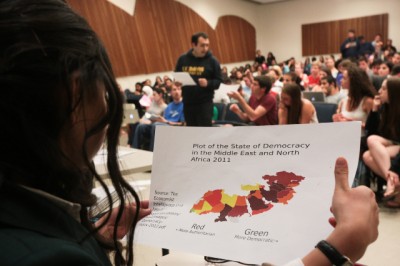
Similar resolutions have been seen on other UC campuses. UC Irvine, UC Riverside, UC San Diego and UC Berkeley passed the resolutions through their student governments. UCLA and UC Santa Barbara saw similar resolutions that ultimately did not pass.
Resolution co-authors Kabir Kapur, a fourth-year political science major and former ASUCD senator, and Diyala Shihadih, a third-year biochemistry and molecular biology double major and president of Students for Justice in Palestine (SJP), said the authors drew upon the bills from other UC campuses to see what would work at UC Davis.
Kapur said he feels that it is a struggle to get things by the UC Regents because they may not directly be in tune with the student experience or student opinions on a lot of issues, but it is still necessary to try.
“Getting stuff by the Regents is problematic in the first place, but I think you have to start at your student government,” Kapur said. “It’s a body for that specific purpose. As social pressure builds up, thats not as easy of a statement to live by.”
Kapur and Shihadih said it is hard to have a discussion regarding the resolution when those not in favor do not feel divesting is the right approach to take.
“It’s hard to have a conversation about the divestment resolution when some people are not even in favor of that approach,” Shihadih said.
Kapur said that there is a history of student activism though resolutions like SR #20 that have been successful in the past. One example was a resolution to divest from apartheid South Africa in the 1970s.
“If it hadn’t worked before, if there hadn’t been successful movements of student activism, I would probably be saying ASUCD should be doing other things,” Kapur said. “But because it has been something ASUCD has done before, it should be on the list of things they keep doing.”
Kapur added that the resolution is also a way to try to take some accountability over the administration and UC Regents.
Legislative process
According to the ASUCD Legislation Guide, “a resolution is used to state the opinion of the Senate” and requires a majority vote from the senate table. Once the legislation has been written, a senator is required to introduce it to the ASUCD vice president. After being introduced at senate, the legislation is referred to the appropriate commissions. If the legislation passes through the majority of the commissions it is seen at, it goes to senate.
ASUCD senator and third-year landscape architecture major Robyn Huey introduced SR #20 on April 17. It was seen by three commissions: ECAC, External Affairs Commission (EAC) and Business & Finance Commission (B&F) on April 28, 29 and May 6, respectively.
ECAC passed the resolution with a 5-4 vote, and EAC failed it with a 2-4-3 vote.
It was determined at the B&F meeting that Kapur and Eliahu were the respective representatives of the pro-divestment and anti-divestment groups. B&F went into a closed session along with Kapur and Eliahu. The resolution passed with a 4-3-2 vote.
Both ECAC and EAC had a closed vote, meaning that voting members voted anonymously. B&F did not have a closed vote.
ASUCD President and third-year Chicano/a studies and sociology double major Armando Figueroa said the legislative process is very unique in the sense that appointed officials can kill bills, as opposed to elected officials.
“You might hear some students mention that elected officials should see this bill because that’s what they’re elected for,” Figueroa said. “But a lot of students want to call for respect of the commission process, respecting their expertise. When it comes to issues that students vote for, it’s just interesting to see students calling for elected officials to see it and not silence it through the commission process.”
A similar resolution, SR #30, was seen last year, but did not make it to the senate table. It was seen by four commissions: the Internal Affairs Commission (IAC), EAC, B&F and ECAC. IAC, EAC and B&F did not pass the resolution.
According to ASUCD Controller and a third-year computer science and engineering major Rylan Schaeffer, IAC decided not to vote on SR #20 because the commission did not find the resolution to be relevant to students.
SR #30 asked for the UC Regents to divest from Caterpillar, Cement Roadstones Holding, General Electric Company and Raytheon.
“Last year we focused on weaponry companies, this year we are taking a more social responsibility view,” Shihadih said. “All these companies may not be supplying the military weapons, but have a key role in establishing the occupation and upholding that structure.”

Kapur and Shihadih said that the author and co-authors learned from last year’s mistakes and went into the process this year with more planning, organization and structure.
Students argue resolution targets Israel, polarizing
The UC Office of the President (UCOP) released a statement in May 2010 addressing the divestment bills that had been discussed at two UC campuses that year.
Former UC President Mark G. Yudof, Regent Russell Gould and Regent Sherry Lansing said in the statement, they “will not bring a recommendation before the Board to divest from companies doing business with the State of Israel” until the United States “government declares that a foreign regime is committing acts of genocide.”
The statement also said, “This isolation of Israel among all countries of the world greatly disturbs us and is of grave concern to members of the Jewish community.”
Groups on campus, such as Aggies for Israel and Aggies Against Divestment, raised similar concerns regarding the resolution.
“One common argument the pro-divestment side said was it [the resolution] doesn’t target Israel,” said Avram Titus, a fourth-year political science major, leader of the Aggies Against Divestment movement on campus and a brother of Alpha Epsilon Pi. “Because the resolution targets companies, if it’s truly targeting human rights violations, then those committed in other countries would be included. This is solely about Israel and Palestine. It’s saying this company commits violations in this country and the resolution doesn’t look at anything else — it’s targeting that country.”
Additionally, representatives from the anti-divestment stance brought up the concern during the senate meeting that the resolution created a divisive environment on campus.
“Any resolution that looks like SR #20 has absolutely no potential to do good on campus,” said Danny Eliahu, a third-year mechanical engineering major and president of Aggies for Israel. “It’s not that the intentions are impure … Regardless of the outcome, nothing good comes out as a result. There’s a problem with the resolution itself and the atmosphere is bad for the campus. There are better options, but they’re neglected.”
Kriti Garg, chair of the Ethnic and Cultural Affairs Commission (ECAC) and a third-year international relations and community and regional development double major, said that she feels that saying the issue is divisive isn’t a reason that it should not be discussed.
“No one is arguing that this issue is not divisive, but that is all the more reason we should be talking about it, and learning about it, and helping educate others,” Garg said.
Former ASUCD senator Ryan Wonders, a third-year international relations and political science double major, said he feels it is irresponsible for student government to take a stance on a massive political issue like this.
“The way that SR #20 presents the issue and the way that its authors have executed their process of promoting it has done nothing but divide students,” Wonders said.
What is the BDS movement?
The term “BDS movement” was brought up frequently throughout the legislation process of SR #20, specifically by the anti-divestment side. According to Eliahu, BDS stands for Boycott, Divestment and Sanctions, and is a movement against Israel. The BDS movement website states “BDS is a strategy that allows people of conscience to play an effective role in the Palestinian struggle for justice.”
Titus said that the BDS movement actively asks for the end of Israel as a Jewish state.
“Minority rights are not protected if you look at the Middle East as a whole,” Titus said. “There’s worry among Jewish citizens that they’d be targeted, there’d be attacks. BDS is thought of as a peaceful tool against Israel and human rights violations. But it’s under the surface that it’s to attack the state of Israel.”
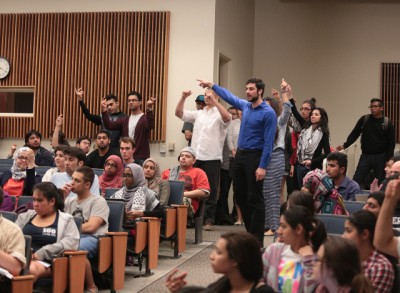
BDS co-founder Omar Barghouti visited UC Davis on Jan. 16 to speak about Palestine and global solidarity movements. According to Titus, Barghouti was invited by SJP, Middle East/South Asia studies (ME/SA), Asian American studies, Native American studies and the Asian American Cultural Politics Research Cluster.
“He [Barghouti] doesn’t support the Jewish state of Israel, which causes a lot of discomfort in the international BDS movement. He’s not the only one in the organization who has those views,” Eliahu said. “The connection he has to the resolution is very apparent. He advised the pro-divestment people in Davis on how to bring the resolution forward.”
Wonders also agreed that SR #20 was guided by the BDS movement.
“The resolution is a part of a larger movement called the BDS movement,” Wonders said. “[The co-authors] received wording, guidance from this movement — [the resolution] was adjusted to fit the political system and climate of the campus.”
Reactions
ASUCD senator and second-year political science major Azka Fayyaz said that she felt more people had the opportunity to speak this year as opposed to last year, and those from the pro-divestment side who felt silenced last year made their voices heard during this year’s process.
“Last year, the anti-divestment community did everything in their power to make sure that they silenced the pro-divestment community,” Fayyaz said. “This year, the pro-divestment community came out stronger. Regardless of whether or not our resolution will pass or fail, they came out and said, ‘We are going to tell our story too.’”
Schaeffer said he was disappointed with the end result in terms of how the bill failed.
“The idea of having a vice president who can break a tie is to prevent ties from happening. And it’s from my understanding that Max[well Kappes] was perfectly within the bylaw, so I take no fault with him,” Schaeffer said. “My objection though is we have a system set up where we want to prevent ties and it yet permits ties to continue to exist.”
Huey was also upset with how the ASUCD legislative process of commissions and senate worked.
“A big issue with the commission meetings was whether to use parliamentary procedure or not,” Huey said.
Schaeffer said he found it interesting that the resolution was seen by three commission bodies, and yet their opinions were never thoroughly discussed at senate.
“The point of the commission bodies [is] to advise the senate on how that particular resolution affects UC Davis’ campus as well as UC Davis’ presentation domestically and abroad,” Schaeffer said. “And to me, that was never part of the discussion at senate. It was almost like the entire thing was a sham; the senators, before they even ran, knew how they were going to vote or they had given it substantial thought.”
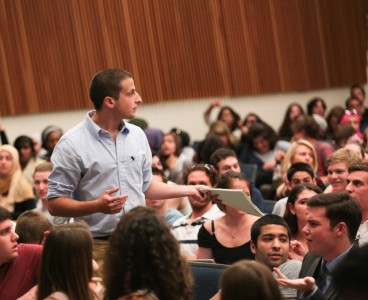
Additionally, Schaeffer said people claimed last year that there was a lack of dialogue regarding the divestment resolution. However, he said this year’s resolution lacked in dialogue as well.
“There are many who claim that dialogue is not possible because of the gulf between the two sides, but I think what should have happened that would have made the debate much cleaner was the attempt at dialogue,” Schaeffer said. “I also feel that — and this is something I noticed during the debates — there are people who could not agree on things we thought were basic and understood by both sides … It’s like two ships passing in the night. There’s not real debate going on.”
Both sides expressed that this year’s legislative process, through the commissions and senate, was more civil and fair than last year.
Kapur said that he felt that the fact that it was more civil and more strategic this year contributed to it getting to senate.
Eliahu said he was impressed with all the senators with how respectful and open to listening they were, as well as the ASUCD vice president.
“It was a lot more civil this year but that doesn’t mean it was more productive,” Eliahu said. “The resolution itself isn’t productive.”
Figueroa said that he is proud of the commission chairs despite their political leanings. During the commissions process, Figueroa actively engaged in public discussion.
“I’m an ally [of the resolution] and I’ve been to every commission meeting it’s gone and in the process, I’ve been speaking with the administration on campus climate and general things revolving around that, really making sure students know that there’s more to this bill than what’s written,” Figueroa said. “I am open to changing my mind on this issue and hearing dialogue.”
Many from the pro-divestment side expressed disappointment and frustration with the way the final vote came about.
”We were obviously disappointed, especially with the way it happened with an abstention,” Kapur said.
Maheen Ahmed, president of the Muslim Student Association and a third-year community and regional development major, said that although it is frustrating, the pro-divestment side does appreciate the time the senators and commissioners took to listen during the meetings.
“We are still very hopeful, [and] will keep raising awareness about the issue,” Ahmed said.
Kapur added that getting the resolution to senate was an ordeal in itself.
”People were also very inspired and thankful that we put as much time into it,” Kapur said. “The good in the situation was that we got it to senate, but it was very disheartening for it to fail in that particular way.”
Potential ballot measure, compromise
During the senate meeting, the co-authors brought forth that this resolution could be placed before the student body as a ballot measure.
Kapur said that is an option he and others in favor of the divestment resolution would want to explore, but nothing has been decided.
Eliahu said he has some concerns about putting forth a ballot measure.
“I have some qualms with it being on a ballot. The resolution itself isn’t accurate or a holistic representation of the conflict. People would take the words of the resolution for granted,” Eliahu said. “It’s bad for voting and bad for the community.”
According to Schaeffer, an issue he has with a ballot initiative is that there would be a flawed turnout, with majority of voters being proponents or opponents of the resolution.
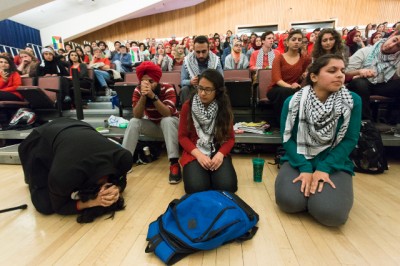
“There is no way of voting on a ballot initiative stating you don’t care or you don’t think it’s relevant to the UC system. So like with a fee initiative, it requires a 20 percent turnout so that ensures we have the sufficient amount of voters who care,” Schaeffer said. “But with a nonfinancial-related fee initiative, that requirement isn’t there. Out of 26,000 undergraduate students, we’re going to have less than 1,000 voting, or less.”
Similarly, Titus said that asking people who are uninformed on an issue to make a judgment call is unfair and biased.
Huey said that a ballot measure could get more of the student body involved and aware of divestment.
“[A ballot measure] is an interesting idea,” Huey said. “If the community does want to and has the ability to carry out a ballot measure campaign, so many more students would be involved.”
Fayyaz said that she feels a ballot measure would be a good idea; however, she thinks that the same issues brought up during the legislative process this time around would be brought up when trying to put something on the ballot.
“The same situation that happened within the legislative process this time around might happen when they are trying to put something on the ballot, because the conversations that will happen are that this is one-sided and this is divisive,” Fayyaz said.
Kapur said that he is not opposed to sitting down with those against divestment to try to work on future resolutions. He and Eliahu had a meeting with each other on May 15, a week after the resolution had been seen in senate, to start a dialogue.
“I feel that both sides have some principles or ideologies that’s not going to be compromised, Kapur said. “Regardless of what bill we put out there, if it says divestment in Israel, there’s going to be a core group of people at this University and outside of this University who are going to go fully against it. I’m willing to compromise and have a conversation.”
CLAIRE TAN and PAAYAL ZAVERI can be reached at managing@theaggie.org.
Photos by Brian Nguyen.


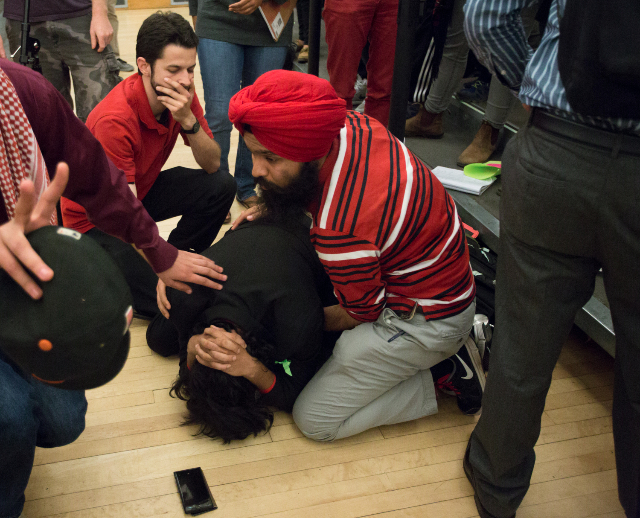


[…] And in a year where student votes have gone against the BDSers 15:3 – or maybe 16:4 after Davis rejected divestment (again) but SJP narrowly won a referendum at DePaul – you’ve seen Israel supporters […]
A beautiful and powerful family of stories, each well told, doing much justice to a complex and emotional issue. Bravo to The Aggie and to all who contributed to it and the debate itself with their time, their efforts and their hearts. Go Ags.